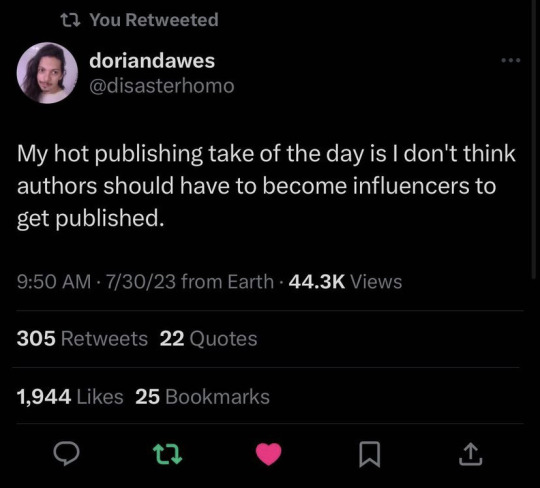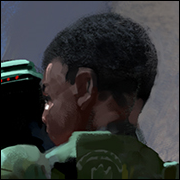|
Data Graham posted:Thanks, this is good -- and it feeds into the continuum of exercises I'm apparently doing in order to really understand and internalize the idea of appreciating a work on its own merits, separated from the author's intent, and the nature of adaptation and fanwork, and really about the whole concept of using language to imperfectly express a platonic "ideal" of concepts and thoughts, like whether there is such a thing as "correct English" or if it's important for people to understand the meanings of the colloquial expressions they're using, or if it's okay if they just repeat meaningless syllables as long as people get what they intend. It's part of why I keep listening to those Olsen podcasts, since they lean very hard toward that idea of evaluating an adaptation in and of itself and not in comparison to its source material, which of course is what you find is what Tolkien was so bothered about in On Fairy-Stories in the first place, where he talks a whole bunch about the various struggles you have trying to envision a textual story versus what you get when a story is rendered by dramatic actors, like where in text you're free to imagine "a piece of bread" in any of a million different ways, as many as there are readers, but as soon as you try to stage it as a play or a movie you have to make a choice about what kind of bread, what shape, on what sort of dish, and for 999,999 viewers those choices will be "wrong". This is a great discussion. Part of the problem lies with a basic conceptual metaphor we have that’s so crucial to how we understand communication—which happens to actually be a false conceptualization. The linguist George Lakeoff in https://en.m.wikipedia.org/wiki/Metaphors_We_Live_By characterized it this way: quote:Ideas (or Meanings) are Objects -> Words (Linguistic Expressions) are Containers -> Communication is Sending So when we write, we tend to think of it as packaging our thoughts in a box with the words written on the outside, which is then transmitted whole, and the person who reads them opens the box and pull our thoughts out intact. But in reality there is nothing in the box—there is no box, just the words on the “package” and the person receiving them reads the outside and has to puzzle out the meaning “packed inside the word” because the “package” can’t actually be opened and our nebulous thought-stuff scooped out. The reader “unpacks” the word using their own experience and comes up with a completely individual interpretation of what the words mean. This metaphor is so ingrained in our thinking (at least Western thinking), that we’re frequently stumped when people don’t get what we mean. People tend to get angry and think, “How could I be clearer?” and assume someone who misinterprets our words must be thick or something. But the truth is even basic words have completely different schema in other people’s minds, no matter how closely they’re culturally related. https://www.scientificamerican.com/article/people-differ-widely-in-their-understanding-of-even-a-simple-concept-such-as-the-word-penguin1 A longer bit in George Lakoff’s book demonstrates how differently it’s possible to conceive things (sorry I don’t have a version I can copy/paste the text from so I have to use images):  
Stuporstar fucked around with this message at 23:29 on Aug 1, 2023 |
|
|
|

|
| # ? May 21, 2024 13:40 |
|
 Unrelated to all of this but the idea of having to become a Book Guy on like, Tiktok or Twitter/X or Tumblr in order to get enough clout or people interested to sell my book absolutely scares me. I don't hate all social media or anything but I kind of want to be able to keep my shitposting separate from my job. Like, if I got published, I'd be fine doing interviews or book signings or what have you but all things considered I wouldn't want to have to constantly be plugging my book all day every day forever.
|
|
|
|
Art is a verb, and occurs between the art object and its beholder
|
|
|
|
Junpei posted:Unrelated to all of this but the idea of having to become a Book Guy on like, Tiktok or Twitter/X or Tumblr in order to get enough clout or people interested to sell my book absolutely scares me. I don't hate all social media or anything but I kind of want to be able to keep my shitposting separate from my job. Please don't take this the wrong way but focus on actually writing the book before you wring your hands over the perils of fame
|
|
|
|
Better to die obscure and unread the subjugate yourself to indignity.
|
|
|
|
The only thing you need to sell a book is an agent who reads your first page and loves it. Publishers may at one point have believed that Influencers Do Numbers but I’m honestly not sure that’s panned out.
|
|
|
|
my thoughts on playwright chat: (if the other theater nerds want to resurrect the theater chat thread then we can take more stage direction chat there) Stage directions can depend on the type of play and your end goal. If you're deliberately writing for a specific venue and director, then sure, maybe go light on stage directions since you know the collab will happen, but if you intend to publish keep notes so you can fill in as much as you see fit. Basically any older script you order from Dramatics (or whatever Samuel French is now) you'll find very elaborate stage directions included, and there's usually a credit that they were transcribed from the original stage manager's notes. All of Lillian Hellman's plays are notated to death in that old timey style, like (Karen touches her face) in the middle of a sentence. It's a reproduction of how the original staging was performed to a T. It's interesting, at least, as a bit of history. That can feel limiting to professionals, and are frequently the type that get crossed out and workshopped; but most writing royalties (if you're lucky) will be from community theater/college/high school productions. So having detailed stage directions is a good blue print for amateurs to get things started. A 'doors' farce/slapstick (Boeing Boeing, and probably Clue counts), or any Agatha Christie stagings are packed with stage and prop directions for good reason. Chris Durang (Vanya and Sonia and Masha and Spike) uses some standard directions in longer material, but also clearly intends his short play collections to both be staged and as things to be read so frequently puts jokes or asides in with the "usual cross USL"). Something to consider when trying to squeeze a few more bucks out of your labor. To contrast some works by the same author, David Lindsay-Abaire, the published script of the 'heavier' drama Rabbit Hole has zero stage direction after the scene setting. Fuddy Meers is a bit surreal so might be tougher to visualize and has many notes from the author. I guess this all boils down to do whatever you want, but I know a lot of royalty-paying amateur companies that rely entirely on the printed stage directions for guidance (for better or worse), so there's a point to having some extensive directions that experienced directors can adapt or ignore (and you can put a foreword in saying so). Part of this, I think is even for long-time directors it can be tough to visualize the scene changes and how furniture/walls/props need to be moved. If your play is four people in the same room for two hours (a la Rabbit Hole) then it's easier for a small company to wrap their heads around a script with no instructions. The Cut of Your Jib fucked around with this message at 00:38 on Aug 2, 2023 |
|
|
|
Sorry to have to go to the Most Famous Guy, but Shakespeare really loved weaving his stage directions directly into the dialogue-when Macbeth sees a floating dagger he questions if it's real "as this which now I draw". Or Oberon simply stating "I am invisible, and I will overhear their conference".
|
|
|
|
Stuporstar posted:This is a great discussion. Part of the problem lies with a basic conceptual metaphor we have that’s so crucial to how we understand communication—which happens to actually be a false conceptualization. The linguist George Lakeoff in https://en.m.wikipedia.org/wiki/Metaphors_We_Live_By characterized it this way: That penguin article is driving me crazy. People don't disagree on what a penguin is, they differ on useless subjective questions like "What’s most similar to a penguin, a finch or a dolphin?" Or on things most people just don't know like "Is a penguin heavy?" Change that to a kitten and the answers will cluster far closer. The Berkeley anecdote is neat but presumably the Iranian student's first language wasn't english and if it was then no one around them used that phrase. Given the "disillusioned" descriptor, they no longer use the original integration. They were wrong. Not to say that people don't interpret things differently, as anyone who has listened to a writing workshop can attest, but you're not casting words into a sea of ambiguity here. For example, "how could I be clearer?" is a weird question, but let's assume there's an issue with clarity. 8 people read it and 6 don't get it. The writer should probably change it since their writing is confused. It's not just a numbers game. If you flip the response around, it's still worth asking the 2 people what their interpretation is. If you italicize a word in dialogue, most people are going to understand how to read it. Some won't. Plenty will read the sentence differently than the precise way you imagined. But it's going to be rare that it's turned into something utterly different like the solution metaphor.
|
|
|
|
ultrachrist posted:That penguin article is driving me crazy. People don't disagree on what a penguin is, they differ on useless subjective questions like "What’s most similar to a penguin, a finch or a dolphin?" Or on things most people just don't know like "Is a penguin heavy?" Change that to a kitten and the answers will cluster far closer. I’m not even concerned with italics chat at this point lol The headline of the penguin article is pretty hyperbolic, yeah. The point is definitions are a fuzzy cluster of associations, and different people will focus on different aspects of a word, which can lead to ambiguity and confusion if not everyone can agree on what association is being drawn from in context. It matters far less for a word like “penguin” than an abstract and heavily politicized word like “freedom.” This is why culturally transmitted metaphors are so useful, because it puts people more or less on the same footing when trying to understand one another. But the ESL speaker has a lot more footwork to do to understand English idioms and the underlying cultural metaphors that are so ingrained in natural English speakers that we aren’t even aware of all of them. The Iranian student got our cultural metaphor “wrong” but that doesn’t mean it wouldn’t work as a brilliant new metaphor in a literary novel. Trying to stretch our own awareness about what our cultural assumptions are and reaching beyond entrenched ones is a valuable exercise. Like if you’re writing sff and want to invent a culture significantly different from Anglo, you could peruse that book Metaphors We Live By to look at how we characterize time, for example, see the “time = a resource” metaphor, and try to come up with something different. I remember reading an ancient Egyptian text that used the metaphor “beautifies her time,” which is so different a metaphor from anything in English it takes a bit of puzzling over. Those are the kind of linguistic puzzles I love and I love to see them in fiction—which is why when I read a translations, I personally prefer literal translations over the just-so matching up of similar idioms that most translators do to make it more digestible to English readers Stuporstar fucked around with this message at 01:42 on Aug 2, 2023 |
|
|
The Cut of Your Jib posted:my thoughts on playwright chat: That's all interesting and good to know. Course now I'm imagining what the screenplay for Noises Off must have looked like and It raises another semi-related question/thing I've always wondered about though: where does a scriptwriter get off writing a thing that is flagrantly unfeasible to stage or film, maybe just as a tossed-off aside? Thinking "exit, pursued by a bear" type stuff. Or more recently, I just watched Big Trouble in Little China, and there's this early CGI eyeball monster that shows up and it just sort of floats in a hallway and barely contributes to the plot at all. But from reading trivia about the production, creating that thing was one of the hugest challenges of the movie, consuming vast amounts of money and human effort, and they had to basically invent whole new technologies just to make it happen for a tiny throwaway gag that might well have been the victim of a run-length edit. My question is — do writers have a sense for what kinds of things are costly or unusually challenging to produce? I mean obviously they must, but how often does it happen that someone will just unthinkingly toss in a thing like that and the director just looks at it and goes *flipping pages* "Welp, nothing for it, we have to either blow our whole budget on this one effect or else there'll be no movie"? Or do directors just say "uhhh this is ridiculous, we're replacing the eyeball monster with a dog in a costume, it'll make just as good a movie" I don't know why I find things like this so bewildering. It's like one of the great "understanding humans" mysteries that I have yet to figure out, and the Industry is so weird and hidebound and tradition-oriented that no matter how much I learn first-hand about little niche bits of it the more it just bifurcates into stranger and deeper unknowns. Data Graham fucked around with this message at 02:49 on Aug 2, 2023 |
|
|
|
General Battuta posted:The only thing you need to sell a book is an agent who reads your first page and loves it. My understanding is that almost all the efforts built around, say, big name Youtuber subscribers converting to readers have been flops.
|
|
|
|
|
General Battuta posted:The only thing you need to sell a book is an agent who reads your first page and loves it. To that point, this very in-depth Reddit post is very transparent about the entire process: https://www.reddit.com/r/PubTips/comments/15fh368/discussion_no_longer_on_submission_stats_details/ It's about YA and I'm not sure what genre Junpei writes, but it's worth checking out regardless
|
|
|
|
I definitely want to write somewhere in the children/YA space, but that post was mostly a faraway worry more than anything else, still I appreciate Hard Facts.
|
|
|
|
Junpei posted:I definitely want to write somewhere in the children/YA space, but that post was mostly a faraway worry more than anything else, still I appreciate Hard Facts. 
|
|
|
|
Dialogue! Doesn't count! I was speaking it! Characters can say that they want to do things all the time!
|
|
|
|
Data Graham posted:where does a scriptwriter get off writing a thing that is flagrantly unfeasible to stage or film, maybe just as a tossed-off aside? Thinking "exit, pursued by a bear" type stuff. Or more recently, I just watched Big Trouble in Little China, and there's this early CGI eyeball monster that shows up and it just sort of floats in a hallway and barely contributes to the plot at all. But from reading trivia about the production, creating that thing was one of the hugest challenges of the movie, consuming vast amounts of money and human effort, and they had to basically invent whole new technologies just to make it happen for a tiny throwaway gag that might well have been the victim of a run-length edit. My question is — do writers have a sense for what kinds of things are costly or unusually challenging to produce? I mean obviously they must, but how often does it happen that someone will just unthinkingly toss in a thing like that and the director just looks at it and goes *flipping pages* "Welp, nothing for it, we have to either blow our whole budget on this one effect or else there'll be no movie"? and sometimes directors or producers think it's funny and want to put it in sometimes it's a testing of bounds sometimes it's a gently caress you for whatever reason sometimes it's a drunk bet sometimes it's a deliberate addition to guarantee a production gets more money sometimes it's something else a LOT of the time this poo poo doesn't go anywhere but the script directors and producers are not beholden to take a screenwriter or playwright's script and do no changes, poo poo gets changed and cut and added All The Time Like, "how often does it happen" is a meaningless question when "it" can be two dozen things for two dozen motivations in an industry where it's expected that everything will change hundreds of times between selling a script and making a thing. Wungus fucked around with this message at 02:53 on Aug 2, 2023 |
|
|
|
Junpei posted:Dialogue! Doesn't count! I was speaking it! Characters can say that they want to do things all the time! Honestly it was more the "I worry about having to talk to fans about my wildly successful book series
|
|
|
|
sebmojo posted:Honestly it was more the "I worry about having to talk to fans about my wildly successful book series So, uh, fun personal fact: Been taking an online college creative writing course. Writing little bits every day for assignments, reading fragments about techniques, all that jazz. I'm Improving! YAYYYYYYYYYYYYYY
|
|
|
|
Junpei posted:So, uh, fun personal fact: Been taking an online college creative writing course. Writing little bits every day for assignments, reading fragments about techniques, all that jazz. I'm Improving! YAYYYYYYYYYYYYYY  it is in no way a panacea, but thunderdome is genuinely excellent for replacing 'hmm maybe i could write a thing' with 'oh poo poo i just wrote 250,000 words'.
|
|
|
|
Data Graham posted:That's awesome (and hilarious), but it still really sounds like the least efficient possible way of conveying the writer's intention to the actors. There's got to be a less lossy way to encode the way the theoretical actors in the writer's head will deliver a line. Having to grind it down into all-caps screenplay heiroglyphics and making the actors and director have to apply their own idiosyncratic talents to decoding it seems like the worst kind of game of telephone. Stuporstar posted:So when we write, we tend to think of it as packaging our thoughts in a box with the words written on the outside, which is then transmitted whole, and the person who reads them opens the box and pull our thoughts out intact. But in reality there is nothing in the box—there is no box, just the words on the “package” and the person receiving them reads the outside and has to puzzle out the meaning “packed inside the word” because the “package” can’t actually be opened and our nebulous thought-stuff scooped out. The reader “unpacks” the word using their own experience and comes up with a completely individual interpretation of what the words mean. I'm currently working my way through A Rhetoric of the Unreal: Studies in Narrative and Structure, Especially of the Fantastic by Christine Brooke-Rose and it is pretty dense with this kind of stuff. Recommend so far! (I haven't made it very far, like three chapters maybe, it's so dense and there's so much lit theory that I'm unfamiliar with.) Data Graham posted:It raises another semi-related question/thing I've always wondered about though: where does a scriptwriter get off writing a thing that is flagrantly unfeasible to stage or film, maybe just as a tossed-off aside? Thinking "exit, pursued by a bear" type stuff. I once had 15 minutes with Ken Davenport, very famous big Broadway producer with many Tony Awards under his belt, in a Zoom workshop to ask his advice about getting our show made into a real thing people can see in theatres. After spending way too long explaining what the show was, I asked him the absolutely noob question of, "How produceable is it?" He made this "urrrgh" noise in his throat for about five seconds then said: "Everything is produceable; it's just a question of where and for what audience." And being young and fixated on all the small details, I sat there feeling like I'd been cheated of some great wisdom and said, "Oh." Then he asked me the killer question: "Have you finished writing it?" I had to admit, with hundreds of other people listening in on Zoom, that no, we had not finished writing it. He asked: "When will you finish writing it?" Me: "Um, I don't know. We're, uh, we're still working through the first act." At that point, he had nothing else to say other than, "Finish writing it," because you can't produce a show that doesn't exist. After that, he made us write him progress update reports. You can bet we stopped sitting on our asses worrying about how a director might stage something and started writing the actual script so we wouldn't have to report "oops, sorry Ken, we're still not done" the next time we were due for a check-in. (Aside: my librettist/lyricist deliberately named one of the characters "Bear" just so she could include that Shakespearean stage direction as a joke.) TL;DR basically this: change my name posted:Please don't take this the wrong way but focus on actually writing the book before you wring your hands over the perils of fame Also, for people thinking about self-pub out there: Junpei posted:Unrelated to all of this but the idea of having to become a Book Guy on like, Tiktok or Twitter/X or Tumblr in order to get enough clout or people interested to sell my book absolutely scares me. I don't hate all social media or anything but I kind of want to be able to keep my shitposting separate from my job. Being That Author who has no off switch for self-promo mode is the surest way to alienate yourself from every community out there. The people who sell on social media are those generally who are active participants in the community and/or those who create massive value for the community. If you do not promo your book, you will not get clicks. If you do not get clicks, you do not get sales or borrows. If you don't like that, then better prepare to sink hundreds and hundreds of hours into researching influencers and crafting a solid pitch to get them interested in your book. Depending on influencer and platform and how likely your book is going to be their jam, you may need to sink $$$ into physical ARCs and goodies and shipping to get a response. But all their TBRs are so long that unless you have a REALLY compelling pitch, you may need to get comfortable with the idea that the most you might ever get is a brief unboxing of your book and they may never read it and your book might, in fact, feature in their next unhaul video. If you don't like that either and you have budget, then you better learn ads and book promo services like Bookbub, etc, which is a whole 'nother thing. Or many things, seeing as how every single ad and promo platform is different. If you don't like any of those things, then you'd better be able to write a book as addictive as Cradle so your rabid fanbase will sell it for you. In all of the above cases, you need to be writing the next book. Most of the paid strategies and the pricing strategies rely on you having multiple books in your catalogue for read through/sell through to be profitable. If having to market and promote your book doesn't sound like it's for you, then self-pub is probably not for you. Unless you just want it out there and you don't care if nobody ever reads it because it makes you happy to know it's out there. In which case, you've still come full circle, because the best thing to do then is hit publish, forget that you published, and get on with writing the next thing. The Cut of Your Jib posted:(if the other theater nerds want to resurrect the theater chat thread then we can take more stage direction chat there)
|
|
|
|
That a penguin is a dolphin article sounds like the study used oddly phrased questions and suspect data plots which is what got the Harvard truthiness people in trouble. I wanna see the actual survey questions and answers. If anything it sounds like a trip to read.Data Graham posted:That's all interesting and good to know. Course now I'm imagining what the screenplay for Noises Off must have looked like and When things are relatively calm, it's in a pretty standard format for plays.This is actually some of the roomiest margins I've seen.  When it's chaotic, it switches to a two column format.  Wungus posted:directors and producers are not beholden to take a screenwriter or playwright's script and do no changes, poo poo gets changed and cut and added All The Time I haven't worked on Broadway or anything, but a few larger places, and loads of dinky ones, and there's a general culture of respecting the author and making every effort to get the words out as they were written. Of course, this is after it's probably been workshopped with a director and cast and gone through previews, so the author would hopefully have straightened out most problems before it's printed. There are some protections offered via licensing that most small places are super scared of.  Some are more explicit about 'no word shall be changed or omitted' and pissface David Mamet has extra threats about suing in all his books. I think Edward Albee did too. One reason, I would wager that lots of small places do zany adaptations of Shakespeare or the Greeks, since a director in a no-horse town can put their own stamp on public domain stuff. - I don't think Big Trouble in Little China was a writer's fault. I'd bet you probably have to be at a certain level of Hollywood insider, or a studio script doctor before you start trying to eff around with the script to inflate budgets or make life harder for a particular director. And mindbending stuff can come from studio exec notes but I'd have to go look for examples. I think Thomas Lennon and Ben Garant's (of Reno 911) book Writing Movies for Fun and Profit had some anecdotes. As I recall, when they wrote Night at the Museum they wanted a sincere kid's movie and all the notes and being fired then rehired after someone else rewrote it made them cynical so they just turned in whatever trash to fill pages. Specifically, BTiLC behind-the-scenes, everything seemed reasonable. First time screenwriters get rewrites from writer who already had some SFX movies credits. John Carpenter had experience with monster puppets/animatronics, coming off of The Thing just two years before, and the VFX company did Ghostbusters. Whether they underbid for the work/took too many jobs at once after the GB hype, or Carpenter gave them too much work too fast, we'll probably never know the real story. Everybody blames everybody else. That's a case of things that probably shouldn't have gone wrong. Though I haven't seen it in years and the first thing I think of is that beholder in the hallway, so If I wrote a movie I wanted to shop around Hollywood, I wouldn't think twice about what the VFX are going to cost. You can argue whether or not blockbusters that cost $200mil should be made at all, but ??? dream big. If it were something I wanted to try and raise fifty grand and do it local then sure, I'd be conscious of what was possible for the money and available skill sets. Leng posted:You mean this one? I think it died because not enough of us were, you know, actually posting scripts. But I'd join you there if it started back up again! This is the one I've had bookmarked forever, so maybe there's a newer one that I just missed. Not exclusive to writing, general theatre arts and stage craft. https://forums.somethingawful.com/showthread.php?threadid=3146319
|
|
|
|
Forgot to address this in my last post:Data Graham posted:My question is — do writers have a sense for what kinds of things are costly or unusually challenging to produce? I mean obviously they must, but how often does it happen that someone will just unthinkingly toss in a thing like that and the director just looks at it and goes *flipping pages* "Welp, nothing for it, we have to either blow our whole budget on this one effect or else there'll be no movie"? Or do directors just say "uhhh this is ridiculous, we're replacing the eyeball monster with a dog in a costume, it'll make just as good a movie" Rewrites are a thing. You finish the script. You workshop it. You get notes. You rewrite the script for notes. You workshop it again. Repeat until you have a version that works enough in a living-room-with-pizza-and-beer setting that you can invite director/actor/producer people not in your writing group for it. Hope that you can snag enough interest from a producer that they'll agree to producing a bigger workshop and invite more people. Repeat until you find enough producers to fund the actual production...or try to raise the money yourself and self-produce it. By this time you've rewritten the script at least five or more times, some scenes definitely at least twelve but you're not entirely sure because you lost track of revisions somewhere around version eight but the song still isn't working but you don't know how to fix it, so you're just gonna forge ahead with the staged workshop and cry in the back of the theatre as you watch the lines land flat with the audience who are laughing when they're not supposed to and not crying when they are supposed to and then you take your script post workshop and you get more notes and you have to rewrite and rewrite and sometimes you're literally rewriting stuff a few hours before the actors get it and there are shows like Wicked that STILL tweak their lines after all these years. Also, how to stage it is the director's problem. Do not underestimate how creative directors can be. Watch Tripod Versus the Dragon for some really cool staging done with a super low production budget. If you're interested in the behind-the-scenes stuff, I recommend watching Angels in New York (https://www.imdb.com/title/tt1288699/) a short docu-series about trying to get a Broadway musical made. Marcus and Ken were really, really, really damned close to getting there. I've met both of them (separately, because Marcus is based in NYC now and Ken's still here in Sydney) and as I understand things, they're still working on getting the show produced. Or if you want it in entertainment format, watch Smash. The Cut of Your Jib posted:Let me read through, I have a full length in the can (and even cribbed from some of my own TD entries for content). Maybe I'll guts up and post. Ohhhhh I never saw that thread. Thanks and bookmarked!
|
|
|
Stuporstar posted:This metaphor is so ingrained in our thinking (at least Western thinking), that we’re frequently stumped when people don’t get what we mean. People tend to get angry and think, “How could I be clearer?” and assume someone who misinterprets our words must be thick or something. But the truth is even basic words have completely different schema in other people’s minds, no matter how closely they’re culturally related. https://www.scientificamerican.com/article/people-differ-widely-in-their-understanding-of-even-a-simple-concept-such-as-the-word-penguin1 Fun fact: Penguins are named that because they resemble the now extinct Great Auk, or Pinguinus impennis, which was much more well-known at the time. In fact, penguins are not even in the same genus as the Great Auk. The real penguin is dead, and these modern pretenders are not even relatives. This amusing fact formed the seed for the first story in my collection.
|
|
|
|
|
Leng posted:But I'd join you there if it started back up again! A short (20 minute play) based on a Thunderdome story, and a complete two-hour, 108 page play based on more than one TD story plus some poo poo I posted in PHIZ KALIFA's thread since that didn't seem like a time based contest. The Cut of Your Jib posted:Spit
|
|
|
|
SimonChris posted:Fun fact: Penguins are named that because they resemble the now extinct Great Auk, or Pinguinus impennis, which was much more well-known at the time. In fact, penguins are not even in the same genus as the Great Auk. The real penguin is dead, and these modern pretenders are not even relatives. I've oft wondered how they taste, congrats on the book. Well i clicked Best Sellers in Short Story Anthologies & Collections and lol. https://www.amazon.com/gp/bestsellers/digital-text/7588876011/ref=pd_zg_hrsr_digital-text I recall getting similar results when googling what kind of 'western / country fiction' people read, thinking I'm going to write True Grit, and got pages of books of shirtless cowboys with six packs. I do not believe this is my genre though they seem very popular. sebmojo posted:

|
|
|
|
Fat Jesus posted:Well i clicked Best Sellers in Short Story Anthologies & Collections and lol. https://www.amazon.com/gp/bestsellers/digital-text/7588876011/ref=pd_zg_hrsr_digital-text Oh look, the AI botsploitation books continue to take up most of the best seller lists. It took a few days for the last category they took over to get cleared. It's like whack a mole from here on out. Serious talk: self pub romance authors are killing it with seasonal anthologies. Last year around Christmas a group of them all wrote short reads branded as a series and co promoted them and basically took over 20 of the top 50 spots on the paid best seller list in their categories for the week. So yeah, following on from promo talk, if you don't want to do social media promo and don't have budget for ads/paid promo, you can try the networking approach and get really really good at doing newsletter swaps.
|
|
|
|
Leng posted:Oh look, the AI botsploitation books continue to take up most of the best seller lists. It took a few days for the last category they took over to get cleared. It's like whack a mole from here on out. How do these people not realise some old guy like me looking for John Wayne or WW2 dirty dozen style books is quickly going to buy elsewhere if that's what the search is giving up. If those were written by bots I don't want to know what's in them.
|
|
|
|
So, I guess it's bad to let an AI write a book for you. I guess it's OK to ask book-related questions from AI though. I want to vent my climate change doom somewhere, and writing a post-apocalyptic sci-fi book would fit the bill. I'm not trying to be original or write something new, I just want to vent, and forums have a limited capacity. I've thought about it for a few years, planned it, made notes etc. I'm writing finally in Finnish since my capacity to express myself in English is not good enough for bookwriting. Problem is, that I'm not the best ideas guy. Like if my guy wakes up from cryo in a vault, is it Ok to ask ideas from AI like what the guy could feel and think, how would a person act in such a situation (assuming he went in ice voluntarily)? Or what could he do in the vault, what could push the guy out of the vault, how to get the story moving etc. It's like new Mission Impossible movies. I have all kinds of scenes in mind, but I'm not the best at figuring out really how to tie them together. Seems that's not easy for movie script writers either, so I'm not alone 
|
|
|
|
AI in its current state cannot answer those questions in a way that is better than "extremely mid". Just figure it out yourself.
|
|
|
|
I've used AI for that a few times. Feed it a premise and character archetypes and say 'what could happen next' and it will always spit out a few ideas. 90% of those ideas will be extremely generic and focus on surface-level trappings, rather than anything deeper or interesting (this is a gothic story? Put your character in a spooky graveyard at midnight!). The other 10% will still be pretty bad but spark a weird glimmer of an idea in your head that feels worth pursuing. If all else fails, when I ask ChatGPT 'hey, what should happen next' and hate all of its answers, I have a great signpost on where *not* take the story. Feeling out the negative space like that usually makes it clearer what direction I should be following instead.
|
|
|
|
You could always read the genre you're interested in for ideas (or how AI works, but with a human)
|
|
|
|
AI’s greatest calling: carving away everything that doesn’t look like an elephant
|
|
|
|
|
AI can't help your writing if you're trying to do anything cool or interesting, because what's cool and interesting is never the safest option that has been done a lot of times and averages out to being the standard thing to do. If that poo poo'll help you, literally just go read the 7 Basic Plots and do exactly as prescribed for the kind of story you're telling. The thing about telling stories is that you've got to come up with the things that happen in the stories. It's hard sometimes. That's the fuckin' thing of it. Sometimes writing's hard, and you can either give up, or you can learn how to get more gooder at doing the things you find hard, or you can not put yourself in situations where you have to write the hard things. If you want random ideas, go and get some StoryCubes. Click a plot randomizer. Watch a movie and imagine what your characters would do in the cool scenes--then write that. You won't write a 1:1 copy. I promise. AI's going to make your writing worse if you rely on it. Period. It's not a crutch, it's trying to replace you, and the only thing it'll help you with is speeding up to the point where you decide you don't wanna write any more.
|
|
|
|
Ihmemies posted:So, I guess it's bad to let an AI write a book for you. I guess it's OK to ask book-related questions from AI though. I want to vent my climate change doom somewhere, and writing a post-apocalyptic sci-fi book would fit the bill. I'm not trying to be original or write something new, I just want to vent, and forums have a limited capacity. I've thought about it for a few years, planned it, made notes etc. I'm writing finally in Finnish since my capacity to express myself in English is not good enough for bookwriting. This is the most complete and thorough write up of how generative AI and ChatGPT in particular works. https://writings.stephenwolfram.com/2023/02/what-is-chatgpt-doing-and-why-does-it-work/ Stephen Wolfram posted:So let’s say we’ve got the text “The best thing about AI is its ability to”. Imagine scanning billions of pages of human-written text (say on the web and in digitized books) and finding all instances of this text—then seeing what word comes next what fraction of the time. ChatGPT effectively does something like this, except that (as I’ll explain) it doesn’t look at literal text; it looks for things that in a certain sense “match in meaning”. But the end result is that it produces a ranked list of words that might follow, together with “probabilities” Short version: It's the most elaborate Mad Libs engine ever created. The only thing 'magical' about it is how natural it sounds, not what it produces. It is literally word salad. You could use it to generate ideas and spitball, but only marginally better than rolling dice, doing tarot, using 'plot idea decks' etc.
|
|
|
|
All computers do is add numbers to each other and sometimes take them away if you want to break it down like that? Tbh that's basically how I write a story, start with a blank page write some kind of actiony sentence then keep writing sentences that fit until I get to the word count. That said, chatgpt does tend to produce extremely mediocre fiction like you'd get from a clever twelve year old, but if it works for you as a tool, even one to tell you what not to do, go for it imo
|
|
|
|
Oh someone made a tumblr post I liked using the Chinese Room experiment as a comparison. https://www.tumblr.com/arp1033/713647484759670784/chinese-room-2?source=share
|
|
|
|
Wungus posted:AI can't help your writing if you're trying to do anything cool or interesting, because what's cool and interesting is never the safest option that has been done a lot of times and averages out to being the standard thing to do. If that poo poo'll help you, literally just go read the 7 Basic Plots and do exactly as prescribed for the kind of story you're telling. It's Quest, Tragedy and Rebirth at least already! I'm going to write terrible slop, I just want to vent, so writing may or may not work! I don't remember all the scifi tropes, so my text will probably be filled with them, since I don't know how to avoid them, or even write competent text with well used tropes. I have set the bar extremely low for myself. Only bar is at least 3000 words a week. If you want to read a good book, you buy one from a local bookstore, not wait for my production  I know AI will give me the safest and most well worn tropes. Such is life. Maybe I will be a better person some day so I can write something more imaginative. Like about a Chair. Or a man with multiple hearts, so they can provide enough blood for all the extra dicks he has grafted onto his skin, so he can have sex with multiple persons at the same time, to achieve maximum pleasure. Yeah I'm not that good with ideas, quite the opposite. Seems AI prefers lists of seven items too, as in the above article. Anyways, my problem is that I'm really not an "ideas" guy. I want to write anyways, but I need someone to give me ideas. It's like mission impossible whatever: dead reckoning pt1. Some idiot like me has a bunch of ideas, but not nearly enough for a full-blown movie. So the ideas are glued together with the thinnest possible watery glue, which barely, just, holds the few cool ideas someone had together. Then they coat it with so much bling that they hope now one notices how garbage their mishmash of cool ideas actually when you look at the complete picture. Here's a few questions I asked from AI for example: Do you have ideas about what the man could do in the vault, after waking up? GPT posted:Certainly, here are a few ideas of what the man might do upon waking up in the vault: Not bad. I think they all repeat in Fallout games at least. Of course Fallout's vaults had all kinds of hosed up ways about "testing" the vault and it's inhabitants. Or.. What could motivate the man to leave the vault, why not stay in the vault? How to force the story to move forward? GPT posted:The man's decision to leave the vault could be driven by a number of factors: Still not bad. I'd have gone with the automatic eviction one myself, before asking. And lastly.. When the man wakes from cryostorage, what could he think about. Feel. How would a person act in such a situation? Let's assume he was voluntarily put into ice. quote:Waking from cryostorage, especially after a long duration, could evoke a wide range of thoughts and feelings in your character. Here are some possibilities: This is definitely the hardest part. I think they all are quite good suggestions. I'm not the most typical person, I mean it's often hard to think about what regular people would do in many situations, or what they think, or how they feel. So it's good to have a checklist you can go through, so the guy won't feel like a robot... a machine. Hopefully. Or maybe it would be cool and good to inject an autist incapable of emotion in such a world. Even harder to write some convincing dialogue between multiple persons. I assume most if not all books have, for a good reason, multiple characters, npc's, or even zombies or whatever as is in the case of I Am Legend. There are more than enough books with multiple persons, I don't have to write yet another one... I want a book about true loneliness in a (mostly) dead world. Just to drive the point home how badly humankind screwed up because everyone wanted to chase the biggest Number. Drama and challenges could be achieved with enviroment (like in Phoenix, but just without AC and water..), the character's mental health (or lack of it), thoughts, hallucinations, whatever. I want someone to wander through the world alone, feeling the crushing weight of all the myriad of failures, showing how badly everything will eventually go. Well at least the first 1/3rd of the book would be that, yes. I have some different ideas for the middle part. Ihmemies fucked around with this message at 22:17 on Aug 2, 2023 |
|
|
|
Fiction Writing Advice and Discussion: Read, Prompt, Repeat.
|
|
|
|

|
| # ? May 21, 2024 13:40 |
|
Junpei posted:Oh someone made a tumblr post I liked using the Chinese Room experiment as a comparison. https://www.sabinasz.net/why-chinese-room-argument-flawed/ This is a good breakdown of the arguments for and against
|
|
|





















